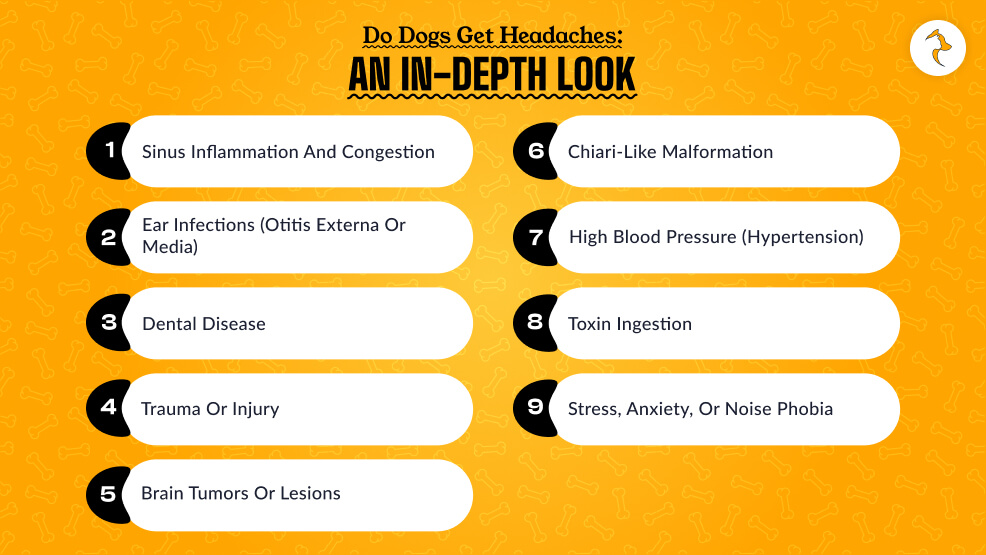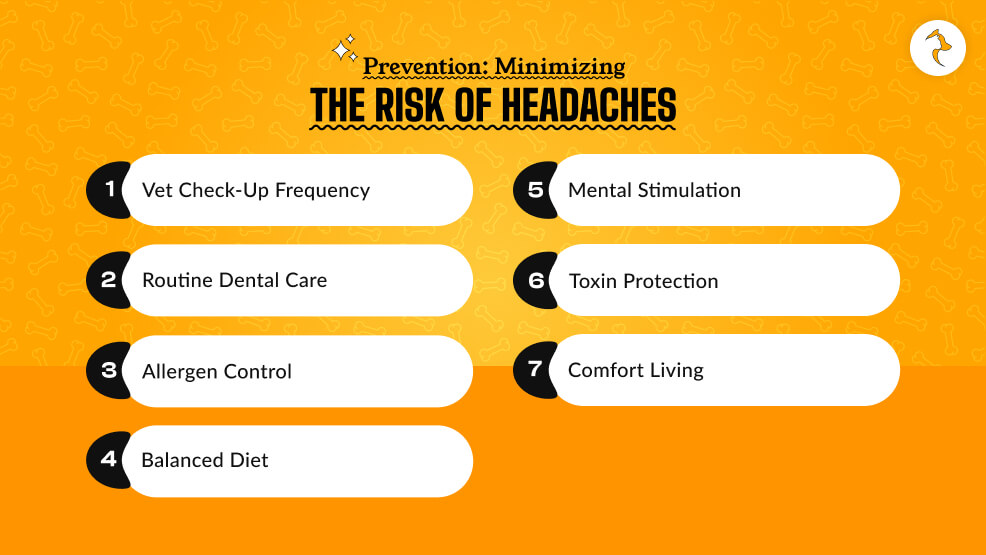Do Dogs Get Headaches? An Insightful Investigation from an Overprotective Pet Parent


Dogs have emotional eyes, wagging tails, and emotional intelligence. They can’t tell us and tell us how they feel, but their salt pet veteran parent can. Some of the things that come requested with a regularity are: “Do dogs get headaches?”
It’s a good question, especially if your dog’s behavior is sleeping, oversensitiveness, or sensitivity to his or her body being touched.
Quick answer: Yes, dogs do get headaches. But the whole story is a bit more dog anatomy, behavior, diagnostic know-how, and vet know-how.
The Neurology of Dog Headaches
Headaches in humans result from irritation or inflammation of brain tissue, nerves, muscles, or blood vessels. Most forms of headaches—and migraines—result from irritation by the trigeminal nerve coursing through head and face.
Ninety-eight percent of our anatomy within our nervous system exists in dogs as well. It consists of:
- Cerebral cortex
- Pain receptors (nociceptors)
- Trigeminal nerve pathways
- Vessels in the skull
- Sinuses and facial muscles
This physical resemblance is one of the most solid evidence that dogs can also suffer from cephalgia—the medical condition of headache.
Pain response tests are employed by veterinary neurologists as a reference to ascertain presumed dog headaches.
Although there is no apparent evidence because dogs cannot talk, physiological and behavioral signs are highly suggestive.
Scientific Support & Expert Opinions
Canine headache literature is limited but expanding. In an article titled “Migraine-like behavior in Cavalier King Charles Spaniels with Chiari-like malformations” in Journal of Veterinary Internal Medicine (2012), migraine-like behaviors in Cavalier King Charles Spaniels with Chiari-like malformations were reported. The animals showed:
- Tactile sensitivity (most severe on head and neck)
- Whining without apparent reason
- Change in behavior during “episodes”
Experts such as Dr. Nicholas Dodman, veterinary behaviorist at Tufts University, have theorized that dogs experience headache-like syndromes from neurological or psychological stressors, especially in breeds susceptible to cranial or sinus disease.
Do Dogs get Headaches: An In-Depth Look

The following is the comprehensive list of the most prevalent and clinical etiologies of dog headaches:
1. Sinus Inflammation and Congestion
- Perhaps secondary to seasonal allergies, exposure to mold, or viral infection
- Sinusitis compresses the underlying tissue and nerves
2. Ear Infections (Otitis Externa or Media)
- Painful ear infections that refer pain to the face and skull
- Presentation: head tilting, head shaking, foul odor, ear scratching
3. Dental Disease
- Over 80% of dogs over 3 years of age have some level of periodontal disease
- Pain referral of infected tooth roots to the jaw and refer the skull
4. Trauma or Injury
- Concussion or intracranial bleeding can be produced by blunt trauma, auto collisions, or a fall
- Can cause vomiting, confusion, or ataxia
5. Brain Tumors or Lesions
- Particularly in elderly patients; benign or malignant
- Produces increased intracranial pressure, inflammation, and pain
6. Chiari-Like Malformation
- Inherited deformity of toy breed dog like the Cavalier King Charles Spaniel
- Results in crowding behind the skull that compresses brain tissue
7. High Blood Pressure (Hypertension)
- Secondary to kidney disease, Cushing’s disease, or other chronic disease
- Also causes intracranial pressure and headache
8. Toxin Ingestion
- Chocolate, xylitol, alcohol, lead, or even some essential oils have a neurologic effect
- They also can have seizures, drooling, and altered behavior
9. Stress, Anxiety, or Noise Phobia
- Dogs can develop tension-type headache because of stress
- Home noise disturbance, firework, or separation anxiety are likely to bring them on
Signs and Symptoms: How to Know If Your Dog Has a Headache

The dog itself is stoic, but there will be some underlying physical as well as behavior changes that indicate head pain that may be observed.
Behavioral Signs
- Fails to make eye contact, or hides behind the furniture
- Pawing repeatedly at face or ears
- Lassitude, and a lack of interest in toys or walking
- Withdraws or hides on being touched on head
- Unpredictably yelps out (whimpering, whining)
- Slept much more, or seemed depressed
Physical Signs
- Stiffness or tension of head and neck muscles
- Squinting or sensitivity to light (photophobia)
- Dilated pupils
- Pacing restlessly
- Deep yawning (a reassurance sign)
- Nausea or vomiting
These overlap into other disease, therefore diagnosis is warranted.
Diagnosis: Vets’ Considerations Whether or Not Dogs Have Headaches

Vets won’t usually say a dog has a “headache” exactly—but they do look for underlying causes of headache.
Diagnostic Procedures may include:
1. Thorough Physical Examination
- Examine ears, teeth, eyes, neurostatus
2. Blood tests & Biochemistry Panel
- For evidence of infection, organ, and infection indicators
3. Otoscopy
- Examines for infection or trauma in eardrum and ear canal
4. Dental Radiographs
- Reveals root fractures, abscesses, or periodontal disease
5. Advanced Imaging (CT, MRI)
- Employs a CT or MRI scan to identify tumors, herniations, or abnormality in the brain
6. Cerebrospinal Fluid (CSF) Analysis
- When suspected inflammation or infection of the brain
Dog Headache Treatment Choices: Helping Relieve Pain from Your Dog’s Head

Following identification of the cause, treatment can advance.
Treatment Measures
- NSAIDs provided by veterinarians: Inflammation, prescribe carprofen, meloxicam, or deracoxib
- Antifungals or antibiotics: In secondary to infection from bacteria or fungi
- Seizure medication: Gabapentin or phenobarbital when caused by neurologic origin
- Steroids: Prednisone in headache of inflammatory nature
- Antihistamines: With allergic sinus pain
**Never give human painkillers to dogs! Ibuprofen, acetaminophen, or aspirin are poisonous and fatal.**
Home Supportive Care
- Maintain a clean and quiet environment
- Employ blackout curtains if light-sensitive dogs
- Employ a soft compress on the neck if cleared by your veterinarian
- Feed bland food and maintain fluidized
- Monitor for exacerbation of symptoms
Prevention: Minimizing the Risk of Headaches

Here are a few home preventative measures for dogs from getting headaches.
- Vet Check-Up Frequency: Early detection and diagnosis of dental, sinus, or neurological issues
- Routine Dental Care: Brushing, chews, and regular cleaning
- Allergen Control: Identify and manage seasonal allergens or food intolerance
- Balanced Diet: Give a balanced diet with vitamins and fatty acids needed
- Mental Stimulation: Prevention of boredom and stress relief by toys and play
- Toxin Protection: Drugs, meds, and some plants to discourage
- Comfort Living: Strictly necessary in stress-susceptible dogs
When to Rush Your Dog to the Veterinarian At Once
Symptoms of headache can be a simulation of signs of life-threatening illness. Be alert if:
- Collapse or loss of consciousness
- Seizures or muscle tremors
- Total disorientation or refusal to rise
- Nystagmus (abnormal eye movement)
- High fever and headache pressure
- Repeated vomiting or bloody diarrhea
- Behavior of being unconscious or dazed
Treatment immediately is what can mean the difference between recovery and serious, potentially life-threatening complications.
Headache Prone Dog Breeds

There are few breeds most likely to be headache disorder-sufferers:
- Cavalier King Charles Spaniels: Chiari-like malformation
- Pugs and Bulldogs: Brachycephalic airway syndrome and sinuses
- Golden Retrievers and Boxers: Risk for brain tumors
- Cocker Spaniels: Chronic otitis externa
- Toy breeds: Susceptible to dental overcrowding and neck strain
Yes, Dogs Do Get Headaches—And They Need Our Help
Even though your dog will never say the words “I have a headache,” science, anatomy, and behavior all confirm headaches are real and often painful events in dogs.
The good news? You can do something. By educating yourself on the symptoms, calming your dog, listening to the voice of experienced veterinary professionals, and preventing the problems, you can enable your dog to lead a healthier, happier, and pain-free life.
Quick Checklist: Suspect a Dog Headache?
- Whines or avoids touch in sunlight?
- Displays shocked lethargy or withdrawal?
- Licks or scratches ears or face?
- Allergies, dental problems, or sinus?
- Recently been subjected to loud noises, toxins, or stress?
If there is a yes to either of those, it is a conversation to your vet well worth having.









Leave A Comment